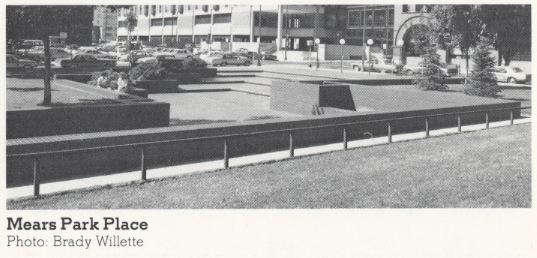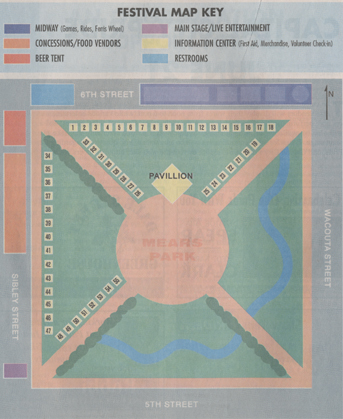Difference between revisions of "Mears Park"
(New page: <div style="text-align: center;"> '''Between 5th St., 6th St., Street. Sibley St., and Wacouta Street., St. Paul''' </div> Along with Rice and Irving Park, Smith (later Mears) Park was t...) |
m (Protected "Mears Park" [edit=sysop:move=sysop]) |
||
| (9 intermediate revisions by one other user not shown) | |||
| Line 1: | Line 1: | ||
<div style="text-align: center;"> | <div style="text-align: center;"> | ||
| − | '''Between 5th St., 6th St., Street. Sibley St., and Wacouta Street., St. Paul''' | + | '''Between 5th St., 6th St., Street. Sibley St., and Wacouta Street., St. Paul (1978), (1997-1999)''' |
</div> | </div> | ||
| − | Along with Rice and Irving Park, Smith (later Mears) Park was the first green space in St. Paul. It initially served an upper-class residential neighborhood that gave way to warehouses and railroad uses. The square fell into disrepair as warehousing left the area, and became Mears Park in 1974. The park may have been a cruising | + | Along with Rice and Irving Park, Smith (later Mears) Park was the first green space in St. Paul. It initially served an upper-class residential neighborhood that gave way to warehouses and railroad uses.<small>(1)</small> The square fell into disrepair as warehousing left the area, and became Mears Park in 1974.<small>(2)</small> The park may have been a cruising site, for this is the case with any public park in the Twin Cities Metropolitan area. However, Mears Park is notable and relevant to queer Minnesota History for a rainy day in 1978—one of the saddest in local history. |
| − | Early organizers of the Twin Cities Pride Committee were affected by the lasting contention between Minneapolis and St. Paul. Often a good-natured sibling competition, the rivalry is based on generalizations about the differences between the Capital City and the Mill City. Locals typically present St. Paul as the working-class local to Minneapolis’ white-collar cosmopolitan. | + | <div style="text-align: center;"> |
| + | [[Image:Svc_mears.jpg]] | ||
| + | </div> | ||
| + | <div style="text-align: center;"> | ||
| + | <small>'''"Mears Park Place" in 1984, six years after the Pride Festival located in the park. Courtesy of "Pocket Architecture St. Paul, by Bernard Jacob and Carol Morphew.'''</small> | ||
| + | </div> | ||
| + | |||
| + | |||
| + | Early organizers of the Twin Cities Pride Committee were affected by the lasting contention between Minneapolis and St. Paul. Often a good-natured sibling competition, the rivalry is based on generalizations about the differences between the Capital City and the Mill City. Locals typically present St. Paul as the working-class local to Minneapolis’ white-collar cosmopolitan.<small>(3)</small> | ||
| + | |||
| + | |||
| + | {| {{prettytable}} | ||
| + | ! | ||
| + | ! | ||
| + | |- | ||
| + | | St. Paul’s queer community spent the first three Pride festivals in Loring Park with few complaints, as a majority of the event’s early attendees and organizers were University students who lived in Minneapolis. As time progressed and attendance rose, St. Paulites began to aggressively seek a festival on the other side of the [[Mississippi River]].<small>(4)</small> | ||
| + | |||
| + | The Pride Committee finally moved the picnic to St. Paul in 1978, two months after voters shockingly repealed a citywide gay rights ordinance.<small>(5)</small> Just three years before, most of the park’s grass and trees were replaced by a “modern” sunken brick plaza. | ||
| − | |||
| + | The result was a depressing site for a bitter community event. Few Minneapolitans actually made the trip to downtown St. Paul, and terrible weather only added to the day’s misery.<small>(6)</small> | ||
| + | | <div style="text-align: center;"> | ||
| + | [[Image:Svc_mearscontmep.jpg]] | ||
| + | </div><div style="text-align: center;"> | ||
| + | <small>'''[[Capital City Pride]] map of Mears Park in 1997. From [[Lavender Magazine]], 1997. Courtesy of the [[Jean-Nickolaus Tretter Collection]].'''</small> | ||
| + | </div> | ||
| + | |} | ||
| − | |||
| + | 1978 was the first (and last) time that the Pride festival took place in St. Paul. St. Paulites created the [[Twin Cities Pride Picnic]] in Como Park and [[Capital City Pride]] to display their distinct brand of local pride. | ||
| − | |||
---- | ---- | ||
| − | + | ||
| + | |||
| + | <small>(1)</small> Millet, Larry. ''Twin Cities Then and Now'' St. Paul: Minnesota Historical Society Press, 1996. Page 129. | ||
| + | |||
| + | <small>(2)</small> Jacob, Bernard and Morphew, Carol. ''Pocket Architecture: St. Paul" Minneapolis: Minnesota Society of the American Institute of Architects, 1984. | ||
| + | |||
| + | <small>(3)</small> Adams, John and VanDrasek, Barbara. ''Minneapolis/St. Paul: People, Places, and Public Life.'' Minneapolis: University of Minnesota Press, 1996. Pages 8-14. | ||
| + | |||
| + | <small>(4)</small> Tretter, Jean-Nickolaus. Interview with the author and Jacob Gentz, 1/16/09 | ||
| + | |||
| + | <small>(5)</small> ''Ibid.'' | ||
| + | |||
| + | <small>(6)</small> ''Ibid.'' | ||
| + | |||
| + | Part of [[Minneapolis/St. Paul, MN: 100 Queer Places in Minnesota History, (1860-1969), (1969-2010)]] | ||
Latest revision as of 11:27, 1 May 2010
Between 5th St., 6th St., Street. Sibley St., and Wacouta Street., St. Paul (1978), (1997-1999)
Along with Rice and Irving Park, Smith (later Mears) Park was the first green space in St. Paul. It initially served an upper-class residential neighborhood that gave way to warehouses and railroad uses.(1) The square fell into disrepair as warehousing left the area, and became Mears Park in 1974.(2) The park may have been a cruising site, for this is the case with any public park in the Twin Cities Metropolitan area. However, Mears Park is notable and relevant to queer Minnesota History for a rainy day in 1978—one of the saddest in local history.
"Mears Park Place" in 1984, six years after the Pride Festival located in the park. Courtesy of "Pocket Architecture St. Paul, by Bernard Jacob and Carol Morphew.
Early organizers of the Twin Cities Pride Committee were affected by the lasting contention between Minneapolis and St. Paul. Often a good-natured sibling competition, the rivalry is based on generalizations about the differences between the Capital City and the Mill City. Locals typically present St. Paul as the working-class local to Minneapolis’ white-collar cosmopolitan.(3)
| St. Paul’s queer community spent the first three Pride festivals in Loring Park with few complaints, as a majority of the event’s early attendees and organizers were University students who lived in Minneapolis. As time progressed and attendance rose, St. Paulites began to aggressively seek a festival on the other side of the Mississippi River.(4)
|
Capital City Pride map of Mears Park in 1997. From Lavender Magazine, 1997. Courtesy of the Jean-Nickolaus Tretter Collection. |
1978 was the first (and last) time that the Pride festival took place in St. Paul. St. Paulites created the Twin Cities Pride Picnic in Como Park and Capital City Pride to display their distinct brand of local pride.
(1) Millet, Larry. Twin Cities Then and Now St. Paul: Minnesota Historical Society Press, 1996. Page 129.
(2) Jacob, Bernard and Morphew, Carol. Pocket Architecture: St. Paul" Minneapolis: Minnesota Society of the American Institute of Architects, 1984.
(3) Adams, John and VanDrasek, Barbara. Minneapolis/St. Paul: People, Places, and Public Life. Minneapolis: University of Minnesota Press, 1996. Pages 8-14.
(4) Tretter, Jean-Nickolaus. Interview with the author and Jacob Gentz, 1/16/09
(5) Ibid.
(6) Ibid.
Part of Minneapolis/St. Paul, MN: 100 Queer Places in Minnesota History, (1860-1969), (1969-2010)

